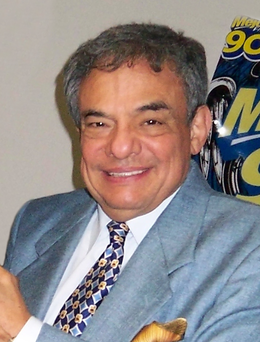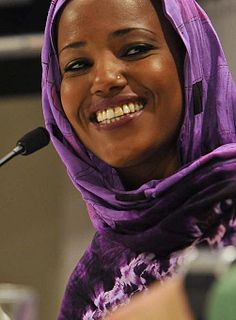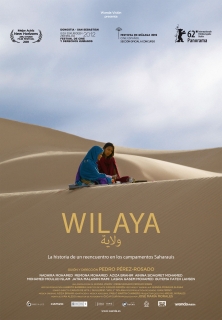
Carlos Alberto Vives Restrepo is a Colombian singer, songwriter and actor.

The Gipsy Kings are a group of flamenco, salsa and pop musicians from Arles and Montpellier in the south of France who perform in Andalusian Spanish. Although group members were born in France, their parents were mostly gitanos, Spanish gypsies who fled Catalonia during the 1930s Spanish Civil War. They are known for bringing Catalan rumba, a pop-oriented music distantly derived from traditional flamenco music, to worldwide audiences. The group originally called itself Los Reyes.

Alejandro Fernández Abarca is a Mexican singer.

The Western Sahara has an established music tradition. Many of the well-known from the country musicians have settled in Dakar, where they mingled further with musicians from West Africa.

José Rómulo Sosa Ortiz, known by his stage name José José, was a Mexican singer, musician and occasional actor. Born into a family of musicians, José began his musical career in his early teens playing guitar and singing in serenades. He later joined a jazz and bossa nova trio where he sang and played bass and double bass. José found success as a solo artist in the early 1970s. Demonstrating his tenor vocal ability with a stunning performance of the song "El Triste" at a Latin music festival held in Mexico City in 1970, he climbed the Latin charts during that decade. Having achieved recognition as a balladeer, his singing garnered universal critical acclaim from musical peers and media.

Sahrauis: The Music of the Western Sahara is a three-disc box set of Saharawi music, published by the Spanish label Nubenegra. It was the first compilation of such songs released in the United States. The producers of the album travelled to the Sahrawi refugee camps and spent 14 days with the artists to record the CDs 1 & 2 of the compilation, with the aim of recording with the finest musicians and singers the traditional Sahrawi music (Haul) of the past and present.

José Antonio Aguilar Jiménez, better known as Pepe Aguilar, is a Mexican-American singer-songwriter and actor.

Maite Perroni Beorlegui is a Mexican actress, singer, songwriter and model, who is best known for starring in the Mexican telenovelas Rebelde (2004), Cuidado con el ángel (2008), Mi Pecado (2009) Triunfo del Amor (2010), Cachito de cielo (2012), La Gata (2014), Antes muerta que Lichita (2015) and Papá a toda madre (2017).

El Canto del Loco was a Spanish pop rock band, although its members recognize that some of their songs are more in the style of power pop. The name of the band comes from the song El Canto del Gallo by Radio Futura.
Blas Cantó Moreno is a Spanish singer. He rose to prominence as a member of the Spanish band Auryn. In 2017, he embarked on a solo career. His debut studio album Complicado was released in September 2018, the album peaked at number one on the Spanish Albums Chart. He will represent Spain at the Eurovision Song Contest 2020 in Rotterdam.

Manuel Mijares is an adult-contemporary pop singer who is billed simply as "Mijares". He began his career at age 23 and achieved high popularity from the mid-80s to mid 90s in Hispanic-America and Japan mainly. From 1997 to 2011 he was married to Mexican singer/actress Lucero, with whom he has two children.

Mariem Hassan was a Sahrawi singer and lyricist from Western Sahara. She usually sang in Hassaniyya, an Arabic dialect spoken mostly in Western Sahara and Mauritania, and occasionally in Spanish. Her use of the Spanish language was related to the former status of Western Sahara as a Spanish colony.
Najm Allal is a singer, guitarist and writer of lyrics in Spanish from Western Sahara.

Viva el Príncipe is the thirteenth studio album by Mexican recording artist Cristian Castro, released on 30 November 2010 by Universal Music Latino. It is a tribute album to Mexican singer José José, Castro's musical idol. The album was produced by Rafael Pérez-Botija who also produced for José José. Viva el Príncipe covers twelve songs by José José and includes a poem recited by Castro's idol. Recording took place on August 2010 at The Hit Factory Criteria in Miami, Florida.

Aziza Brahim is a Sahrawi singer and actress.

Shouka is the second album of Sahrawi singer Mariem Hassan. It was recorded again at Axis studios, in Madrid, and produced by Manuel Domínguez, who is also the boss of the label Nubenegra. The album reached Number 1 on the World Music Charts Europe (WMCE) on March 2010. "Shouka", the central song that titles the album, is a new experience in the Sahrawi music, as it is structured as a cantata. Taking the verses of Sahrawi poet Lamine Allal, Hassan developed a nine paragraph critical response to the 1976 speech of then Spanish opposition leader and later president of Spain Felipe González at the Sahrawi refugee camps, by using all scales and rhythms of the Haul. In this work, Mariem's group is completed with Lamgaifri Brahim and Vadiya Mint El Hanevi. Several other musicians contributed to the album, as Senegalese Malick Diaw (guitar), Spanish Kepa Osés (bass), Hugo Westerdahl (bass), Josemi Sánchez (guitar) and Jaime Muñoz (flutes), Iranian Behnam Samani and Davood Varzideh (ney), and Cuban-Haitian Mel Seme (percussionist).
Brahim Ghali is the current president of the Sahrawi Arab Democratic Republic (SADR) and former SADR Ambassador to Algeria. Ghali has served as an historic figure and played a key role in the struggle of the Sahrawi people for self-determination and independence from Morocco. He was instrumental in the creation of the Movement for the Liberation of the Saguia el Hamra and Wadi el Dhahab, the 1970 Zemla Intifada against Spanish rule, the foundation of the Popular Front for the Liberation of Saguia el-Hamra and Río de Oro in 1973, and the Sahrawi Republic in 1976. He also played a major role in the Western Sahara War and establishment of MINURSO, the UN peacekeeping mission for the Western Sahara.

Mabruk is the first LP of Sahrawi singer Aziza Brahim, after her 2008 EP Mi Canto. The album is accompanied by a 16-page booklet which includes French translation of the songs, and a text by Sahrawi writer Bahia Mahmud Awah on the history of their people. It was elected as 2012 World Music Album of the Year by the Dutch magazine Heaven.

Wilaya is a 2011 Spanish film directed by Pedro Pérez Rosado. The film is a minimalist drama about a Sahrawi refugee family suddenly confronted with the death of the mother and the return of the younger sister, who had lived most of her life in Spain, reflecting the separation of many Sahrawi families.

Soutak is a 2014 album by Sahrawi singer Aziza Brahim, and her first album for Glitterbeat Records.

















